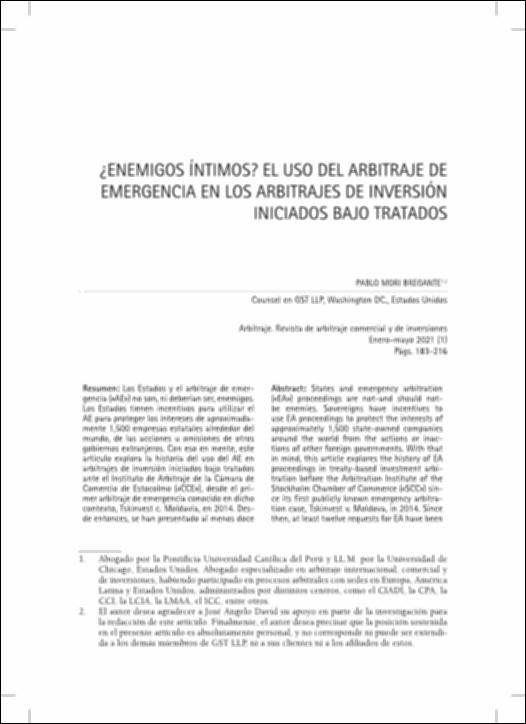Please use this identifier to cite or link to this item:
http://hdl.handle.net/10637/13624¿Enemigos íntimos? : el uso del arbitraje de emergencia en los arbitrajes de inversión iniciados bajo tratados.
| Title: | ¿Enemigos íntimos? : el uso del arbitraje de emergencia en los arbitrajes de inversión iniciados bajo tratados. |
| Authors : | Mori Bregante, Pablo |
| Keywords: | Arbitraje de emergencia.; Arbitraje de inversiones.; Test Broches.; Cámara de Comercio de Estocolmo.; Tratados de inversión.; Emergency arbitration.; Treaty-based investment arbitration.; Broches test.; Stockholm Chamber of Commerce.; Investment treaties. |
| Abstract: | Los Estados y el arbitraje de emergencia («AE») no son, ni deberían ser, enemigos.
Los Estados tienen incentivos para utilizar el
AE para proteger los intereses de aproximadamente 1,500 empresas estatales alrededor del
mundo, de las acciones u omisiones de otros
gobiernos extranjeros. Con eso en mente, este
artículo explora la historia del uso del AE en
arbitrajes de inversión iniciados bajo tratados
ante el Instituto de Arbitraje de la Cámara de
Comercio de Estocolmo («CCE»), desde el primer arbitraje de emergencia conocido en dicho
contexto, Tskinvest c. Moldavia, en 2014. Desde entonces, se han presentado al menos doce solicitudes de AE ante la CCE, existiendo al
menos cinco laudos de emergencia públicos,
que nos permiten entender el razonamiento de
los árbitros de emergencia. Estos laudos también resaltan la importancia de contar con un
recurso rápido y adecuado para obtener medidas provisionales que de otro modo no estarían disponibles para los demandantes hasta
que se constituya el tribunal arbitral, lo que en
los hechos podría tomar hasta quince meses.
Existen críticas y preocupaciones válidas respecto al uso del AE en disputas de inversión,
entre otras cosas debido al temor de usurpación de los poderes soberanos de un Estado.
Sin embargo, diversas solicitudes de emergencia, que buscaban evitar la aplicación de reformas tributarias o liberar a personas físicas
que habían sido detenidas luego de un proceso
penal local, han sido rechazadas, protegiendo
así la soberanía de los Estados. También debe
recordarse que las determinaciones jurisdiccionales que toman los árbitros de emergencia
son solo prima facie y que los laudos de emergencia son, en el mejor de los casos, solo provisionales y susceptibles de ser revocados una
vez constituido el tribunal arbitral. En general,
el uso del AE en arbitrajes de inversión parece
ser una herramienta útil tanto para inversionistas como para Estados. Por tanto, las partes
deberían tener al menos la libertad de elegir
si aceptan o no al AE, en lugar de que exista
una prohibición general contra dicho tipo de
procedimientos en las reglas aplicables. States and emergency arbitration («EA») proceedings are not-and should notbe enemies. Sovereigns have incentives to use EA proceedings to protect the interests of approximately 1,500 state-owned companies around the world from the actions or inactions of other foreign governments. With that in mind, this article explores the history of EA proceedings in treaty-based investment arbitration before the Arbitration Institute of the Stockholm Chamber of Commerce («SCC») since its first publicly known emergency arbitration case, Tskinvest v. Moldova, in 2014. Since then, at least twelve requests for EA have been initiated before the SCC, five of which have resulted in five publicly known emergency awards that give a preview into the mind of emergency arbitrators. These awards also highlight the importance of having a speedy and adequate remedy to obtain provisional measures that would not otherwise be available to investors until the arbitral tribunal is constituted, which, in practice, could take up to fifteen months. Criticisms are and will continue to be levelled against the availability and use of EA proceedings in investor-state disputes, among others, due to fears of encroachment on sovereign powers. Still, it cannot be discounted that requests for emergency measures have been denied to the extent that these requests sought to prevent the enforcement of tax reforms or to release natural persons who had been imprisoned after a local criminal proceeding. It should also be recalled that jurisdictional determinations of emergency arbitrators are only prima facie and EA awards are at best provisional, capable of being overturned once the arbitral tribunal is constituted. On balance, EA proceedings in treaty-based arbitration can be a useful tool for investors and States alike. Parties to a dispute should, thus, at least be free to choose whether to avail of EA instead of being straightjacketed by a blanket proscription against emergency proceedings. |
| Description: | En: Arbitraje: revista de arbitraje comercial y de inversiones. eISSN. 2603-9281. vol. 13, n. 1, 2021, pp 183-218 |
| URI: | http://hdl.handle.net/10637/13624 |
| Rights : | http://creativecommons.org/licenses/by-nc-nd/4.0/deed.es |
| Issue Date: | 1-May-2021 |
| Appears in Collections: | 2021 Arbitraje nº 1 |
Items in DSpace are protected by copyright, with all rights reserved, unless otherwise indicated.


